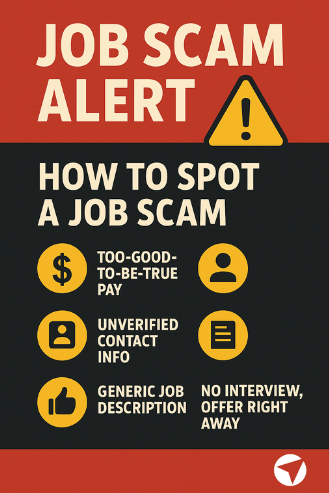Are You Aware of THIS Scam … ?
Too Good To Be True!!! 💸💸💸
Hey there! I'm [name] from the [seemingly legitimate, name brand] hiring team.
We recently reviewed your resume and think you'd be a good fit for our remote online job opportunity.
It involves helping content creators enhance their visibility on the YouTube platform.
The job is simple, and we provide comprehensive guidance to help you get started quickly.
- Only 60–90 minutes a day
- Earn $250–$500 per day + $1000 base every 4 workdays
- Work from anywhere
- Free training
- Paid time off: 15–20 days per year + public holidays
If you are interested and are over 25 years old, please send "Job Details" to this number: +1 ###-###-#### for more information.
Typical of employment scams, especially ones that try to
• Steal personal information
• Trick you into sending money
• Use you for money laundering (often disguised as “easy online work”)
Multiple red flags 🚩 🚩 🚩
1. Too-good-to-be-true pay
• Claims like ”$250–$500/day for 60–90 minutes” of simple work are almost always fake.
• $1,000 base pay every 4 days? That’s $7,000/month for ~7 hours of work per week. This is unrealistic for entry-level tasks.
2. Unverified identity
• They claim to be from “Indeed” or a known brand — but offer no official company email, website link, or job title.
• Legit recruiters don’t ask you to text random numbers for job details.
3. Generic job description
• “Helping content creators enhance their visibility on YouTube” is vague and buzzwordy, often used by scam artists to sound appealing while hiding the real (possibly shady or illegal) task.
4. No interview, no application, no verification
• Real jobs involve at least an application process, interview, or screening. This skips everything.
5. Use of messaging apps or phone numbers
• Telling you to text a number or message on WhatsApp/Telegram is classic scam behavior.
• Scammers move communication off email to avoid being flagged or tracked.
6. Age filter (25+)
• This is arbitrary and likely used to make it sound more “selective,” when in fact it’s a trick to add legitimacy.
What Usually Happens Next
• They ask for your bank info, ID, or Social Security Number under the guise of “setting up payroll.”
• They may send you fake checks to deposit and ask you to buy gift cards, transfer money, or “pay a vendor” — a common money mule scam.
• Some will ask you to buy a training kit or software (then disappear).
What to Do
• Do NOT respond.
• Block the number.
• If it’s via email, mark it as phishing.


